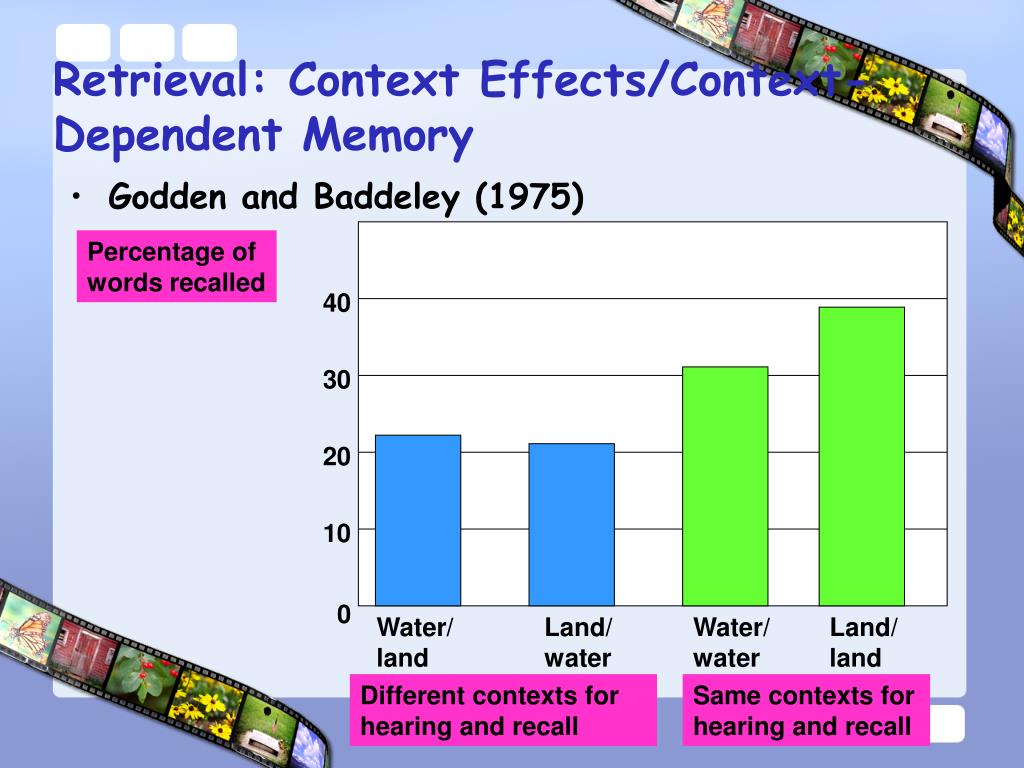

Context dependent memory how to#
When the group with the drug were placed back in the maze without the drug they could not remember how to escape the shock but if they were given the drug again they could recall how to escape the shocks. They were then placed in a simple maze and taught to escape an electrical shock. Overton (1964) experimented on two groups of rats, one group was given a mild barbiturate the other group did not get the drug.

There is further support for the influence of state-dependent cues. However it was a controlled experiment so it can be replicated so reliability can be tested. The participants knew that they were taking part in a study so they might have changed their behavior (demand characteristics) to fit in with the aims of the study. This study has limited ecological validity because the tasks performed by the participants were artificial therefore their performance might not reflect the way they would perform on tasks in every day life. This supports the state-dependent memory theory as the performance was best in the participants who were sober or intoxicated on both days. The SS participants performed best in all tasks. More errors were made on day 2 in the AS and SA condition than in the AA or SS conditions, however this was not the case for the picture recognition test. They found that information learnt while drunk is more available when in the same state later. The Participants had to perform 4 tests: an avoidance task, a verbal rote-learning task, a word-association test, and a picture recognition task. The intoxicated groups had 111 mg/100 ml alcohol in their blood, and they all showed signs of intoxication. Group 4: (SA) was sober on day 1 and intoxicated on day 2.Group 3: (AS) was intoxicated on day 1 and sober on day 2.Group 2: (AA) was intoxicated both days.

They were randomly assigned to four groups: The participants were asked to recall after 24 hours when some were sober but had to get drunk again. Words when they were either drunk or sober. (1975) carried out an experiment on emotional state by asking forty-eight male medical students to remember a list of They will be more likely to retrieve the information when they are in a similar state. For example, a person may be alert, tired, happy, sad, drunk or sober when the information was encoded. State retrieval clues may be based on state-the physical or psychological state of the person when information is encoded and retrieved. State-dependent memory refers to improved recall of specific episodes or information when cues relating to emotional and physical state are the same during encoding and retrieval.

This theory is difficult to disprove as if recall does not occur is it because the information is not stored or because you are not providing the right cue? (circular argument) This theory can be applied to real life: police uses this theory in cognitive interview by asking witnesses to describe the context in which the incident took place to enhance their recall. The studies carried out do not take into account the meaning of the material and the level of motivation of the person when learning the information. Abernathy (1940) found that students performed better in tests if the tests took place in the same room as the learning of the material had taken place, and were administered by the same instructor who had taught the information. There is further support for the influence of contextual cues. This could have influenced their recall.However it was a controlled experiment so it can be replicated so reliability can be tested. This study has limited ecological validity because the environment was familiar to the divers but the task was artificial as we are not usually asked to learn a list of meaningless words in our everyday life.Īnother weakness is that the groups who learnt and recalled in different environments were disrupted (they had to change environment) whereas the groups who learnt and recalled in the same environment were not disrupted.


 0 kommentar(er)
0 kommentar(er)
